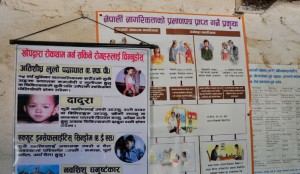
Sheetal Sharma, PhD student in the Centre for Midwifery, Maternal and Perinatal Health (CMMPH), published her latest paper this week in the Asian Journal of Social Sciences & Humanities [1]. The paper ‘Nepenglish’ or ‘Nepali English’: A New Version of English? raises the question whether we are beginning to see a new variant of English.
The paper is co-authored with Mrs. Pragyan Joshi from the United Nations Development Programme (UNDP) in Kathmandu and BU Prof. Edwin van Teijlingen. Sheetal’s PhD research focuses on the evaluation of a large-sclae maternity care improvement intervention in rural Nepal.
The paper is based on listening to people in Nepal speaking English and reading their writing in English. English is a living language and different native and non-native speakers develop English in slightly different ways. This paper argues that it is time to consider whether we should study the English spoken by native-Nepali speakers (Nepenglish) as a separately developing variant of English. The question is particularly intriguing since Nepali English bears such a similarity with Indian English, as both are largely based on originally Sanskrit-based languages. The focus is particularly on how native-Nepali speakers express themselves in English.
Reference:
- Sharma, S., Joshi, P., van Teijlingen, E. (2015) ‘Nepenglish’ or ‘Nepali English’: A new version of English? Asian Journal of Humanities & Social Sciences 4(2): 188-193. www.ajssh.leena-luna.co.jp/AJSSHPDFs/Vol.4%282%29/AJSSH2015%284.2-21%29.pdf
Prof. Edwin van Teijlingen
CMMPH












 REF Code of Practice consultation is open!
REF Code of Practice consultation is open! BU Leads AI-Driven Work Package in EU Horizon SUSHEAS Project
BU Leads AI-Driven Work Package in EU Horizon SUSHEAS Project Evidence Synthesis Centre open at Kathmandu University
Evidence Synthesis Centre open at Kathmandu University Expand Your Impact: Collaboration and Networking Workshops for Researchers
Expand Your Impact: Collaboration and Networking Workshops for Researchers ECR Funding Open Call: Research Culture & Community Grant – Apply now
ECR Funding Open Call: Research Culture & Community Grant – Apply now ECR Funding Open Call: Research Culture & Community Grant – Application Deadline Friday 12 December
ECR Funding Open Call: Research Culture & Community Grant – Application Deadline Friday 12 December MSCA Postdoctoral Fellowships 2025 Call
MSCA Postdoctoral Fellowships 2025 Call ERC Advanced Grant 2025 Webinar
ERC Advanced Grant 2025 Webinar Update on UKRO services
Update on UKRO services European research project exploring use of ‘virtual twins’ to better manage metabolic associated fatty liver disease
European research project exploring use of ‘virtual twins’ to better manage metabolic associated fatty liver disease